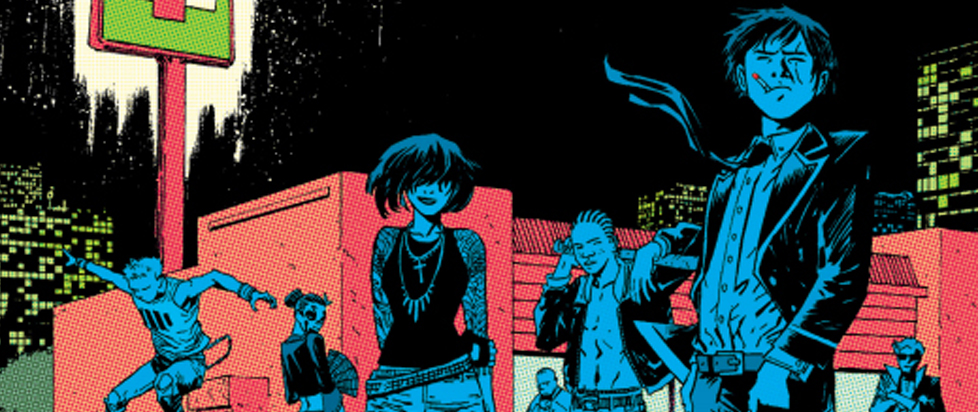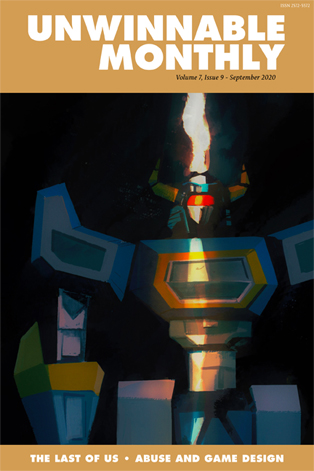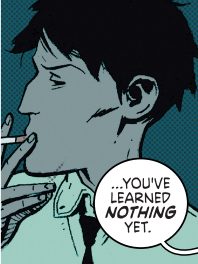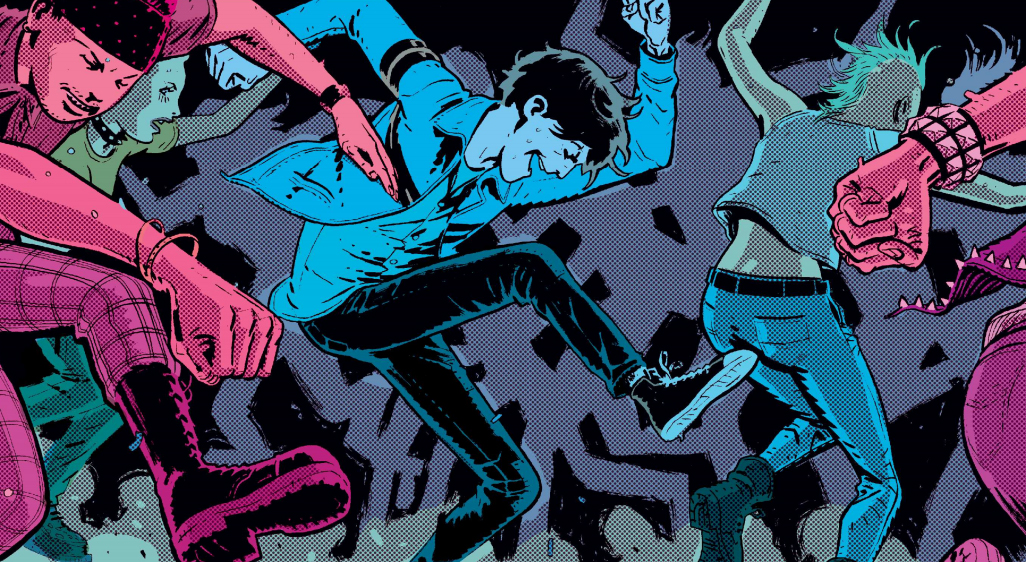
There’s No Youth Anymore
 This column is a reprint from Unwinnable Monthly #131. If you like what you see, grab the magazine for less than ten dollars, or subscribe and get all future magazines for half price.
This column is a reprint from Unwinnable Monthly #131. If you like what you see, grab the magazine for less than ten dollars, or subscribe and get all future magazines for half price.
———
Personal marks scattered through time.
———
I have never been of the rebellious type, but there is one anecdote I always recall fondly. Back when I was a fourteen-year-old high schooler, I was dating an eighteen year old woman. She was my first formal partner and my mother’s first set of horror stories. The relationship was met with disapproval from both my parents, but I endured either way. The problem is that I started lying, in a very sloppy way, to make that happen.
In this particular story, her best friends, a couple that already in their 20s, invited us to a gig in a bar that was around two hours away from my home. The plan was for all four of us to meet up at my ex’s place, grab a bus and then take a train all the way to its final station. The boyfriend was the bassist and singer of the band, so I didn’t want to miss it. But there was no scenario in which my mother was going to grant me permission.
I had been in the relationship for the most part of that year already, and there had been many clashes between my mother and I. I was clear about her age from day one, but my honesty put everything into risk from the beginning, so I had to improvise. I’d often go and meet her after class, telling my mom I was studying at a friend’s place or some other weak excuse. It worked fine for a while, but there was always a risk. A risk that was met with hesitation, followed by a gut feeling to give the decision a second thought.
By then we had already fought a couple times, but she was slowly regaining her confidence, so she agreed on letting me stay at a friend’s place for the night. Or at least that’s what I had told her. She thought I was on a sleepover five blocks from my home – instead, I was on a train with the person I wasn’t supposed to meet, travelling fifteen miles away. Again, I was sloppy.
The night went well. We had a couple beers, watched the bands live and then slowly made our return late into the night. I was hesitant about whether or not to just return home directly, but I had to go back to my ex’s place. Not only my backpack was there, but my phone as well. I had only realized this when we were already on the train and it haunted me throughout the entire night, wondering if I had missed a message or a call. For those couple hours, I tried my best to ignore the outside world and just enjoy the moment.

Needless to say I was grounded for several weeks after that, a prospect I had foreseen when I picked up my phone and saw my notification bar filled with missed calls and dozens of voice messages. Turns out that my mom had offered to send over ice cream to my friend’s home as a thank you gesture to his parents, but was surprised when I didn’t reply back. In the morning, she went to knock on the door and asked if anything had happened. They had no idea of what she was talking about.
Despite the awful moment, and the similarly bittersweet memories that followed in the next couple months, this is an anecdote I always go back to. It was the only period of my life where I actually felt capable of doing anything and proud of being a pain in the ass for the first time. It was a raw and inspiring feeling that was perpetually in conflict with the boy I always had been. But part of me loved that. Despite only being 23 years old now, I have never been able to experience this again.
Deadly Class is a comic book series that started back in 2014, written by Rick Remender and illustrated by Wes Craig, as well as a handful of other artists. It tells the story of Marcus Lopez Arguello, a young orphan who is enrolled into a secret assassin’s school, where he learns the craft of killing and the moral codes that come with the profession. But it’s also a tale about falling in love with dangerous people, breaking rules and getting into fights until sunrise.
As fictional as the premise is, Remender tells readers in the afterword of the first volume that most of his inspirations come from real life experiences, being a downtown Phoenix teenager in the mid 1980s, around the time when the punk and skate scenes from Los Angeles had blended in the underground culture there. Deadly Class takes place in San Francisco, but the interpretations remain tied to his years growing up around goths, rockabillies and stoners. Hanging out in the back of the gym, smoking weed in between classes. But living in this era also involved relentless violence in the streets on a daily basis.
“This story takes place in a recognizable world,” he says. “There’s no magic. No spaceships. No one can fly or shoot eye beams. It’s a coming of age story about broken kids expected to deal with a violent world. It’s the 80s. No cell phones or email. And many of these stories are based on true events. I’ve never tried anything quite like this before. And I’ve never had so much fun making a comic.”

I already delved into the struggles and obstacles that came with turning my hobby into an actual job in my previous column, talking about my decision to write for a living. But I didn’t have the chance to talk about how much work has intertwined my daily life, to the point where everything I do usually involves it.
I’m not afraid to admit that I work best when I’m under pressure. A lot of my work has begun and been delivered on the same day as the deadline. The problem is that working freelance doesn’t guarantee a paycheck at the end of the month, so you’re always pushed into taking more than you can handle, just so you know there will still be work once you’re done with the current commission. Don’t get me wrong, it’s always a privilege to be able to do this, considering how highly competitive the field is and the few opportunities available out there. It just comes down to the fact that I don’t know how to treat it as a job that goes against having a schedule, but desperately requires one regardless.
Two of the trips I had last year were work related and I did an awful job at taking care of myself, barely getting any sleep, skipping several meals and taking on much more than I should have. The other two were vacations from the get-go, but I wasn’t able to detach myself from work. I wrote, I edited, I met deadlines, instead of spending that time paying attention to what my friends were saying. But this goes even far back. My first ever trip with friends, which was a two weeks long escapade to the coast just outside the city, involved several afternoons in a cyber café, covering news shifts for a couple Argentine pesos per month. All the while my friends were at the beach, asking me to come and join them. After a few days they just stopped insisting, because they knew there was no way of convincing me. I have borrowed friends’ laptops a dozen times to finish articles ever since, as I apologized to my editor for being late when it really wasn’t the case.

Looking at Gmail is a constant, too. I sleep with my phone under my pillow and whenever I wake up in the middle of the night, I take a quick look to see if an editor located on a different timezone replied to my emails. This isn’t a revelation or anything, I am conscious of everything I have mentioned. It’s a topic I often bring up in therapy, as conversations often start with “this is everything I did in the past week” and end with “this is everything that’s left to do this week.” I constantly think about how to improve it, but with work comes responsibility. Editors are usually more than understanding when I ask for an extra day, especially this year, but I often do so when I know I’m juggling something else that has to be done first.
All of this affects my lifestyle, too. I enjoy (or used to, rather) going out on the weekends, but it mostly happened because my friends invited me first. I have turned them down several times when I was rushing a piece, often on a Friday night or during the weekends. Over time I began to understand the importance of procrastinating, even if just for one night in the week. But the habit of looking at my phone expecting a Gmail notification and thinking about the day after always creeped inside my head.
Freelancing is and will always be, by nature, a voice in your head that can’t be shut down, telling you that you’re wasting time when you try to relax and that you’re not doing enough when you’re literally juggling several deadlines at a time. I often look around and see my peers going through similar experiences, and it sucks. But that’s the job. The problem comes with not knowing where to pull the brake even if it’s just for a few minutes. Quarantine has made this effort almost non-existent, and suddenly spending 10 to 14 hours on the PC became the norm. There’s periods where I try to clock off at a certain time. But if I’m working on a big project, then I know it’s gonna happen again. I just accept it.
It hurts to look back at a memory where my friends were hanging out, doing literally anything else, while I was sitting in a corner trying to hit a word count and my mind cried for 30 minutes off the computer. But what hurts the most is that I feel I have been missing out on many key moments of my life, and there’s no way to recover them. That part of me who would neglect his responsibilities with such grace got lost in the way, too.
When I see the folks from Deadly Class, I see the high school and young adult years I wish I could have experienced to some degree. I wish I could have caught a ride to the middle of nowhere, to make a whole lot of shitty decisions, more often. As painful as it was back then, it was a formative experience. It showed me that there’s so much more out there waiting for me, and that sometimes you have to get out of your comfort zone to get to them.
2020 is the year in which I dyed my hair for the first time. The year where I spent months trying to cure my two recently added piercings that would get infected at least once per month. I don’t know what awaits me after quarantine is over and I’m able to go out into the world again. But I know who I want to be and the places I want to go, and how much of myself I need to change in order to accomplish this.

There’s a moment in the comic where Marcus finds himself in a mosh pit, acting surprised as he thought they weren’t a thing anymore. His friend Saya invites him to join her, but he refuses. “Not really interested in getting beat up by a bunch of strangers trying to sell how aggressive they are.” She sees this different, describing it as a pure expression of their enthusiasm and joy for the music. But it’s the last line of the conversation that stuck up with me. “Quit being so fucking judgmental of everything and you might actually have some fun for a change. Contrary to what you seem to think, life is supposed to be enjoyed.”
Deadly Class is often the only escape from my current reality. Changing my course in life now would be silly and irresponsible – I love my job, and I don’t see myself changing careers anytime soon. We’re all trapped in our work from home environments either way, and at this rate it’s not gonna change anytime soon. But I’m also someone in his 20s who has chosen to put his work first during many key moments of my life, and didn’t get to enjoy them fully.
The thought of leaving everything behind and never looking back is scary. It’s a risk met with hesitation, followed by a gut feeling to give the decision a second thought. And that’s what makes it so liberating.
———
Diego Nicolás Argüello is a writer from Argentina who has learned English thanks to videogames. He also runs Into The Spine and is objectively bad at taking breaks. You can catch him procrastinating on Twitter @diegoarguello66.




